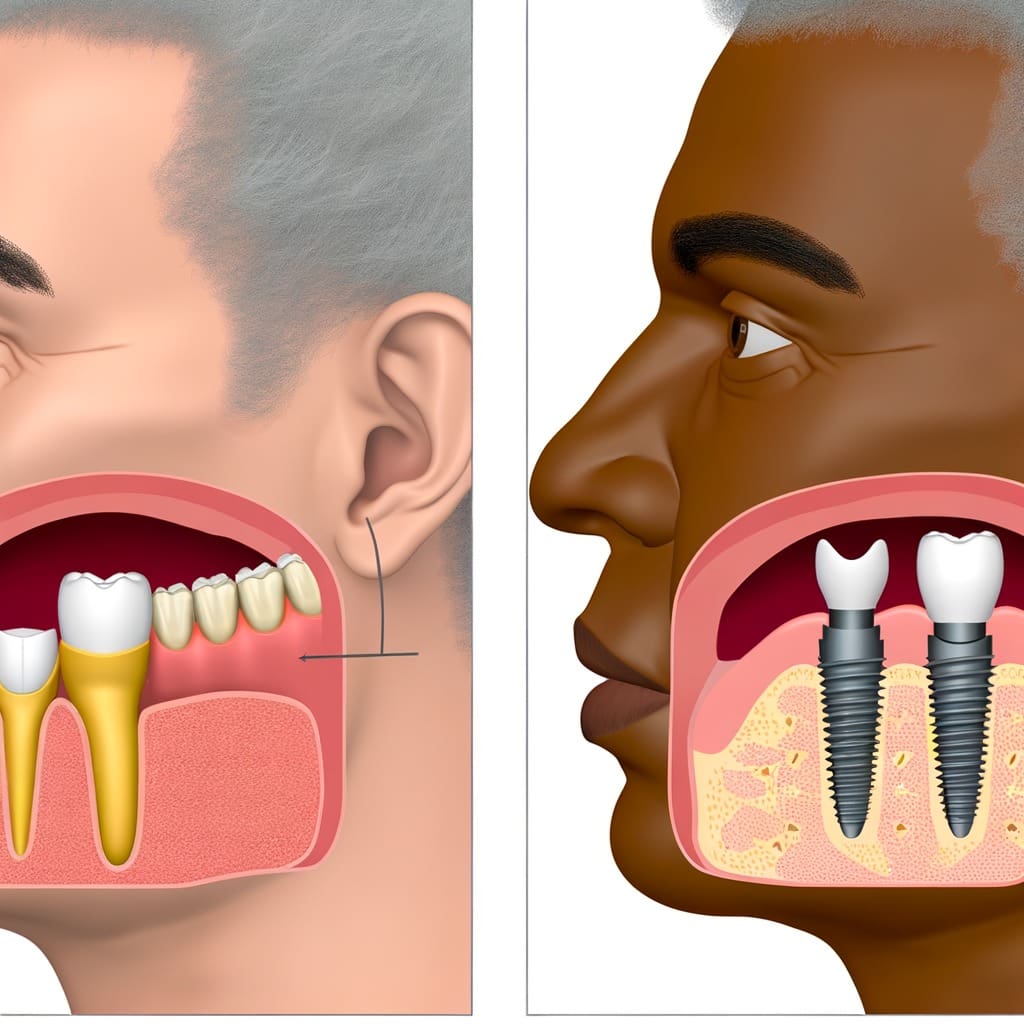For those suffering from TMJ (Temporomandibular Joint) disorders, finding relief from pain and discomfort is a top priority. Nightguards offer a non-invasive solution, providing both immediate and long-term benefits. This article delves into the world of nightguards, exploring their types, benefits, and the role they play in comprehensive TMJ management. Whether custom-fit or store-bought, proper maintenance and a holistic approach to TMJ pain relief can lead to improved oral health and a better quality of life.
Key Takeaways
- Nightguards are an effective tool for alleviating TMJ-related discomfort, preventing teeth grinding, and improving sleep quality.
- Custom-fitted nightguards, though more expensive, offer a precise fit and are generally more effective than over-the-counter options for TMJ symptom relief.
- A comprehensive approach to TMJ pain relief includes nightguards, physical therapy, stress management, lifestyle changes, and exploring advanced treatments like Botox.
Understanding Night Guards and Their Role in TMJ Management


Types of Night Guards for TMJ Relief
When you seek relief from TMJ pain, nightguards for TMJ pain relief are an essential consideration. These devices are designed to alleviate the discomfort associated with TMJ disorders by preventing teeth grinding and reducing stress on the jaw during sleep. Choosing the right nightguard is crucial for effective symptom management. There are several types to consider:
- Soft nightguards, ideal for mild cases of bruxism and TMJ symptoms.
- Dual laminate nightguards, which offer a soft interior and a hard exterior, suitable for moderate bruxism.
- Hard nightguards, made from acrylic, are best for severe cases and offer the highest level of protection.
Consultation with a dental professional is imperative to determine the severity of your condition and to recommend the most suitable type of nightguard. Factors such as comfort, durability, and budget, including insurance coverage, should be taken into account to ensure that you can use the nightguard consistently and receive optimal protection for your jaw.
The Immediate Benefits of Night Guards
Upon introducing a night guard into your nightly routine, you will likely notice a swift alleviation of discomfort. Night guards serve as a cushion for your jaw and surrounding muscles, offering a reprieve from the pain associated with TMJ disorders. This relief is not only immediate but also extends into your daily life, promoting a more comfortable and functional day-to-day experience.
The benefits of night guards extend to the preservation of your dental health. They are designed to:
- Evenly distribute biting forces
- Cushion the impact of tooth grinding
- Prevent chipping and excessive wear of your teeth
Moreover, night guards contribute to improved sleep quality. By softening the sound and impact of grinding, they minimize sleep disturbances, allowing for a more restful and uninterrupted night’s sleep. Over time, the regular use of a night guard can lead to a reduction in the popping and locking of the jaw, commonly caused by bruxism, thus restoring functionality and further easing discomfort.
Custom-Fit vs. Store-Bought Night Guards: Making the Right Choice
When it comes to managing TMJ pain with night guards, you are faced with the decision between custom-fit and store-bought options. Custom-fit night guards are tailored to your unique dental profile, offering a precise fit and enhanced comfort. They are made from high-quality, dental-grade materials and are designed to last, making them a worthwhile investment despite the higher initial cost.
On the other hand, store-bought night guards provide immediate accessibility and affordability. They are a convenient choice if you are seeking a quick solution or if your budget is a primary concern. However, they may not offer the same level of comfort or durability as custom-fit guards and typically need to be replaced more frequently.
To make an informed decision, consider the following factors:
- The severity of your TMJ symptoms and the level of protection required
- Your personal comfort preferences and the fit of the night guard
- The long-term cost-effectiveness, taking into account the durability and replacement frequency
- Your budget and potential insurance coverage
Consulting with a dental professional can guide you to the most suitable choice for your situation, ensuring that you receive the optimal protection and relief for your TMJ disorder.
Maintenance and Care for Night Guards
To ensure the longevity and effectiveness of your night guard, a consistent maintenance routine is essential. Daily cleaning is fundamental; rinse your night guard with cool water each morning and gently clean it with a soft-bristled toothbrush and non-abrasive soap or a denture cleaner. It’s important to avoid hot water, which can deform the material.
Periodic disinfection is also crucial for maintaining hygiene. Soak your night guard in a mixture of water and vinegar or hydrogen peroxide for up to half an hour, then thoroughly rinse it. Steer clear of harsh chemicals such as bleach or alcohol-based solutions, as these can damage the night guard.
After cleaning, it’s vital to let your night guard air dry completely. Store it in a clean, ventilated case to prevent moisture accumulation and bacterial growth. By adhering to these care guidelines, you can prolong the life of your night guard and ensure it remains a hygienic part of your TMJ management routine.
Comprehensive TMJ Pain Relief Strategies


Physical Therapy and Muscle Tension Reduction
Engaging in physical therapy is a pivotal step in managing TMJ disorders, as it directly addresses the muscle tension that often exacerbates jaw pain. A licensed physical therapist can guide you through exercises tailored to strengthen and relax the jaw muscles, thereby reducing the discomfort associated with TMJ.
Key components of physical therapy for TMJ may include:
- Jaw exercises to improve mobility and relieve tension
- Posture correction to alleviate undue stress on the TMJ
- Techniques for proper alignment during sleep and daily activities
In conjunction with night guards, which serve to protect your teeth and reduce strain on the jaw during sleep, physical therapy offers a non-invasive approach to TMJ pain relief. It is essential to follow the regimen prescribed by your healthcare provider to achieve the best results. While immediate relief may be noticeable, long-term improvement often requires consistent practice and dedication to the therapeutic exercises.
Lifestyle Changes to Mitigate TMJ Symptoms
Adopting certain lifestyle modifications can play a pivotal role in alleviating the symptoms associated with TMJ disorders. Incorporating a regimen of jaw exercises and relaxation techniques can significantly reduce the strain on your temporomandibular joint, leading to a decrease in discomfort and improved jaw function.
Consider these adjustments to your daily routine:
- Mindful eating habits, such as avoiding hard or chewy foods that require excessive jaw work.
- Implementing stress-reduction practices like meditation, yoga, or deep-breathing exercises to help relax the jaw muscles.
- Ensuring proper posture, especially during prolonged periods of sitting, to prevent additional pressure on the TMJ.
By integrating these strategies into your life, you can help manage the pains and pressures of a TMJ disorder. It is essential to approach TMJ pain relief holistically, as a combination of treatments, including the use of night guards, may offer the most comprehensive benefit.
The Impact of Stress Management on TMJ Disorders
The intricate relationship between stress and TMJ disorders is well-documented. Emotional or psychological stress often manifests physically as teeth clenching or jaw tightening, exacerbating symptoms of TMJ disorders. Managing stress is therefore a critical component in the holistic treatment of TMJ issues.
Effective stress management strategies may include:
- Mindfulness meditation to cultivate a state of relaxation
- Regular physical exercise to reduce tension
- Cognitive-behavioral therapy to address stress-related habits
Incorporating these techniques into your daily routine can lead to a significant reduction in the frequency and severity of TMJ symptoms. By prioritizing stress management, you not only improve your TMJ condition but also enhance your overall well-being.
Exploring Advanced Treatments: Botox and Beyond
When traditional methods for managing TMJ disorders, such as nightguards, do not provide sufficient relief, it may be time to consider advanced treatments. Botox injections have emerged as a promising option for many patients, offering a reduction in muscle tension and spasms associated with TMJ pain.
However, it is crucial to approach these treatments with caution. The FDA has not approved any drugs specifically for TMJ disorders, and while Botox may alleviate discomfort, there are concerns about potential side effects, including bone loss observed in animal studies. The National Institutes of Health (NIH) also cautions that surgical interventions should be a last resort, reserved for severe cases due to the lack of proven safety and efficacy.
For those considering advanced treatments, here is a structured approach:
- Consult with a TMJ specialist to discuss the severity of your symptoms and explore all options.
- Evaluate the potential benefits and risks of Botox injections with your healthcare provider.
- Consider the long-term implications and ensure that any treatment plan is part of a comprehensive approach to TMJ management.
- Continuously monitor the effects of the treatment and maintain open communication with your dental or medical professional.
Suffering from TMJ pain can be debilitating, but you don’t have to endure it any longer. At Waban Dental Group, we specialize in comprehensive TMJ pain relief strategies tailored to your unique needs. With over 40 years of excellence in dental services, our expert team is committed to providing you with the best care possible. Don’t let TMJ pain hold you back. Visit our website to learn more about our TMJ treatment options and schedule your appointment today!
Conclusion
In summary, nightguards serve as a vital tool in the management of TMJ pain and bruxism, offering a non-invasive and practical solution to alleviate symptoms and improve quality of life. While they do not cure TMJ disorders, the consistent use of a properly fitted nightguard can significantly reduce discomfort, protect against tooth damage, and enhance sleep quality. It is essential to consult with dental professionals to select the right type of nightguard that suits individual needs, ensuring comfort and effectiveness. Ultimately, incorporating nightguards into a comprehensive treatment plan, which may include physical therapy, stress management, and lifestyle adjustments, can lead to a more comfortable, pain-free daily experience and a healthier, happier smile.






